辅音与元音的连读1
英语常用连读大全
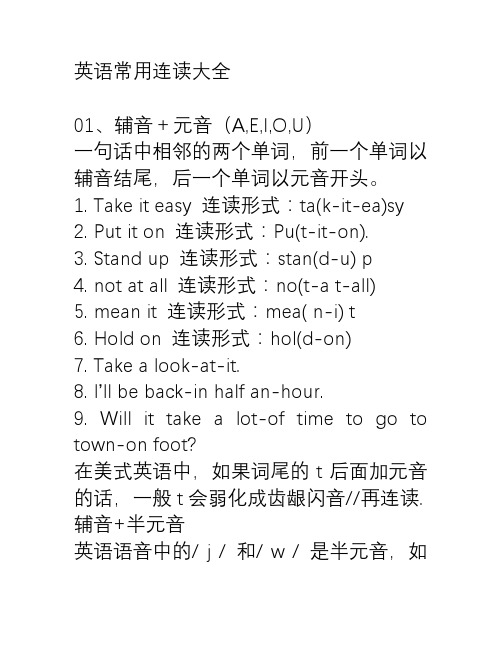
英语常用连读大全01、辅音+元音(A,E,I,O,U)一句话中相邻的两个单词,前一个单词以辅音结尾,后一个单词以元音开头。
1. Take it easy 连读形式:ta(k-it-ea)sy2. Put it on 连读形式:Pu(t-it-on).3. Stand up 连读形式:stan(d-u) p4. not at all 连读形式:no(t-a t-all)5. mean it 连读形式:mea( n-i) t6. Hold on 连读形式:hol(d-on)7. Take a look-at-it.8. I’ll be back-in half an-hour.9. Will it take a lot-of time to go to town-on foot?在美式英语中,如果词尾的t后面加元音的话,一般t会弱化成齿龈闪音//再连读. 辅音+半元音英语语音中的/ j / 和/ w / 是半元音,如果前一个词是以辅音结尾,后一个词是以半元音,特别是/ j / 开头,此时也要连读。
例如:Thank you.This year is a leap year.We will hack your computers.辅音结尾+h此时h不发音,与前面的辅音连读。
如果前一个单词以辅音音素结尾,后一个单词以辅音音素/ h / 开头,语速较快时,直接穿透/ h / 与后面的元音发生连读。
例如:What happened?/ wtpnd/What will he do? / wli: /Does he know? /dzi/Has he done it before? / hzi: /Must he go? / msti: /Should he….? / di: /Leave him. / li:vm /注:them在连读时可以发/m/,缩写为'em,并与前一个辅音连读。
如Let 'em go./lem go/02、元音+元音句话中相邻的两个单词,前一个单词以元音结尾,后一个单词以元音开始,两个元音之间用一个滑音连在一起。
英语拼读发音规则
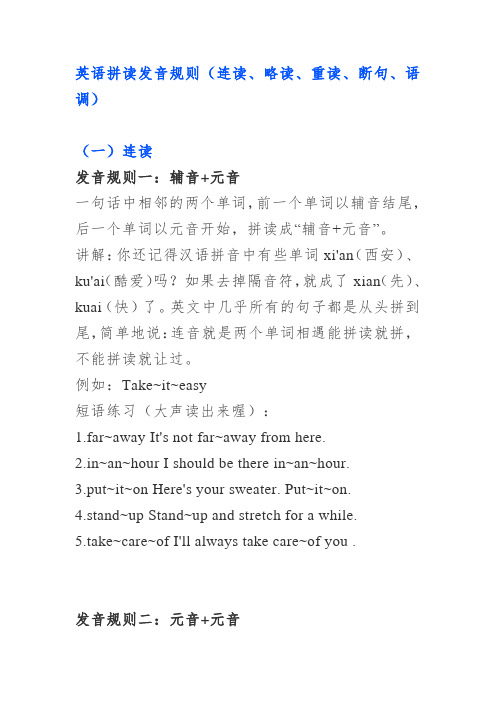
英语拼读发音规则(连读、略读、重读、断句、语调)(一)连读发音规则一:辅音+元音一句话中相邻的两个单词,前一个单词以辅音结尾,后一个单词以元音开始,拼读成“辅音+元音”。
讲解:你还记得汉语拼音中有些单词xi'an(西安)、ku'ai(酷爱)吗?如果去掉隔音符,就成了xian(先)、kuai(快)了。
英文中几乎所有的句子都是从头拼到尾,简单地说:连音就是两个单词相遇能拼读就拼,不能拼读就让过。
例如:Take~it~easy短语练习(大声读出来喔):1.far~away It's not far~away from here.2.in~an~hour I should be there in~an~hour.3.put~it~on Here's your sweater. Put~it~on.4.stand~up Stand~up and stretch for a while.5.take~care~of I'll always take care~of you .发音规则二:元音+元音一句话中相邻的两个单词,前一个单词以元音结尾,后一个单词以元音开始,则在两个元音之间加上一个轻微的[j] 或[w] 的音,拼读成“元音+ [j] 或[w] +元音”。
[i:]或[eɪ]结尾的元音+[j]+元音1、see us→see [j] usCome and see~us again soon.2、be over→be [j] overIt will be~over soon.3、be able→be [j] ableWill you be~able to come tomorrow?4、say it →say [j] itCould you say~it again please?5、pay Ann →pay [j] AnnPlease pay~Ann her salary.以[u:]或[əʊ] 结尾的元音+[w]+元音1、do it→do [w] itDon't do~it again.2、go up→go [w] upLet's go~upstairs and have dinner.3、show us→show [w] usCan you show~us something else.注:元音与元音的连音是一种自然滑过后带出来的音。
英语连读规则(完整版)+常见的连读短语及句子
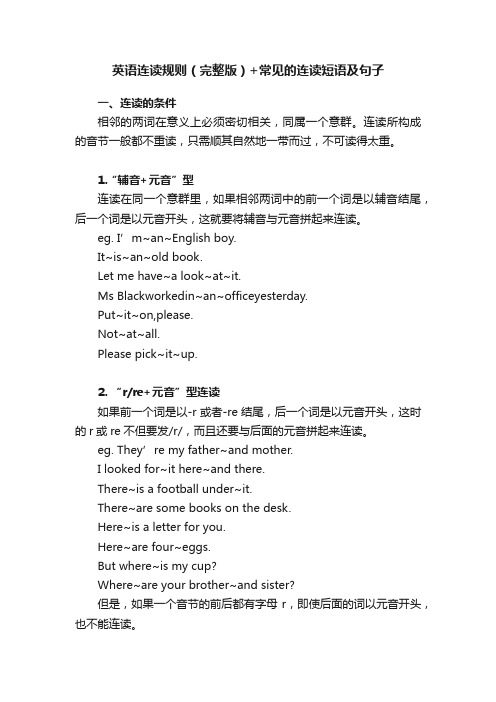
英语连读规则(完整版)+常见的连读短语及句子一、连读的条件相邻的两词在意义上必须密切相关,同属一个意群。
连读所构成的音节一般都不重读,只需顺其自然地一带而过,不可读得太重。
1.“辅音+元音”型连读在同一个意群里,如果相邻两词中的前一个词是以辅音结尾,后一个词是以元音开头,这就要将辅音与元音拼起来连读。
eg. I’m~an~English boy.It~is~an~old book.Let me have~a look~at~it.Ms Blackworkedin~an~officeyesterday.Put~it~on,please.Not~at~all.Please pick~it~up.2. “r/re+元音”型连读如果前一个词是以-r或者-re结尾,后一个词是以元音开头,这时的r或re不但要发/r/,而且还要与后面的元音拼起来连读。
eg. They’re my father~and mother.I looked for~it here~and there.There~is a football under~it.There~are some books on the desk.Here~is a letter for you.Here~are four~eggs.But where~is my cup?Where~are your brother~and sister?但是,如果一个音节的前后都有字母r,即使后面的词以元音开头,也不能连读。
The black clouds are coming nearer and nearer.(nearer与and不可连读)3.“辅音+半元音”型连读英语语音中的/j/和/w/是半元音,如果前一个词是以辅音结尾,后一个词是以半元音,特别是/j/开头,此时也要连读。
eg. Thank~you.Nice to meet~you.Did~you get there late~again?Would~you like~a cup~of tea?Could~you help me, please?“音的同化”—常把/d/+/j/读成/dV/,did you听上成了/dIdVu/,would you成了 /wudVu/,could you成了 /kudVu/4.“元音+元音”型连读如果前一个词以元音结尾,后一个词以元音开头,这两个音往往也要自然而不间断地连读到一起。
英语连读发音规则_汇总
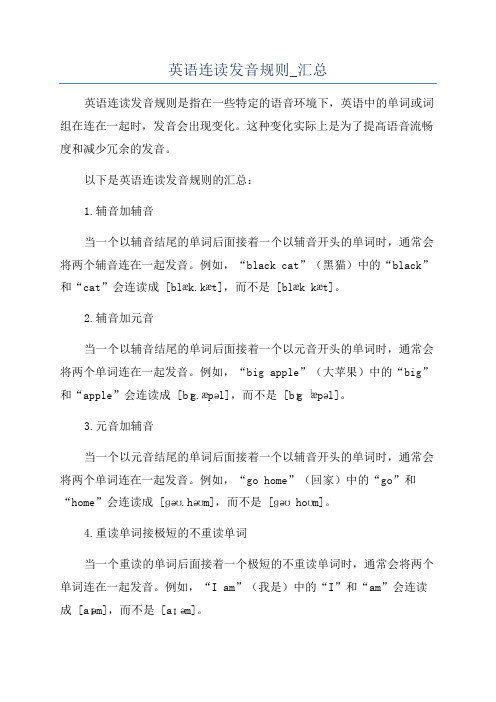
英语连读发音规则_汇总英语连读发音规则是指在一些特定的语音环境下,英语中的单词或词组在连在一起时,发音会出现变化。
这种变化实际上是为了提高语音流畅度和减少冗余的发音。
以下是英语连读发音规则的汇总:1.辅音加辅音当一个以辅音结尾的单词后面接着一个以辅音开头的单词时,通常会将两个辅音连在一起发音。
例如,“black cat”(黑猫)中的“black”和“cat”会连读成[blæk.kæt],而不是[blæk kæt]。
2.辅音加元音当一个以辅音结尾的单词后面接着一个以元音开头的单词时,通常会将两个单词连在一起发音。
例如,“big apple”(大苹果)中的“big”和“apple”会连读成 [bɪg.æpəl],而不是 [bɪg ˈæpəl]。
3.元音加辅音当一个以元音结尾的单词后面接着一个以辅音开头的单词时,通常会将两个单词连在一起发音。
例如,“go home”(回家)中的“go”和“home”会连读成 [ɡəʊ.həʊm],而不是 [ɡəʊ hoʊm]。
4.重读单词接极短的不重读单词当一个重读的单词后面接着一个极短的不重读单词时,通常会将两个单词连在一起发音。
例如,“I am”(我是)中的“I”和“am”会连读成 [aɪəm],而不是 [aɪəm]。
5.同一元音加同一辅音当两个相同的元音后面接着相同的辅音时,通常会将两个单词连在一起发音。
例如,“good day”(好日子)中的“good”和“day”会连读成 [ɡʊd.deɪ],而不是 [ɡʊd deɪ]。
6.元音加半元音当一个元音后面接着一个半元音时,通常会将两个单词连在一起发音。
例如,“boy and”(男孩和)中的“boy”和“and”会连读成 [bɔɪənd],而不是 [bɔɪənd]。
7.指代词接辅音当一个指代词(如“him”、“her”、“it”等)后面接着一个以辅音开头的单词时,通常会将两个单词连在一起发音。
英语常见的连音
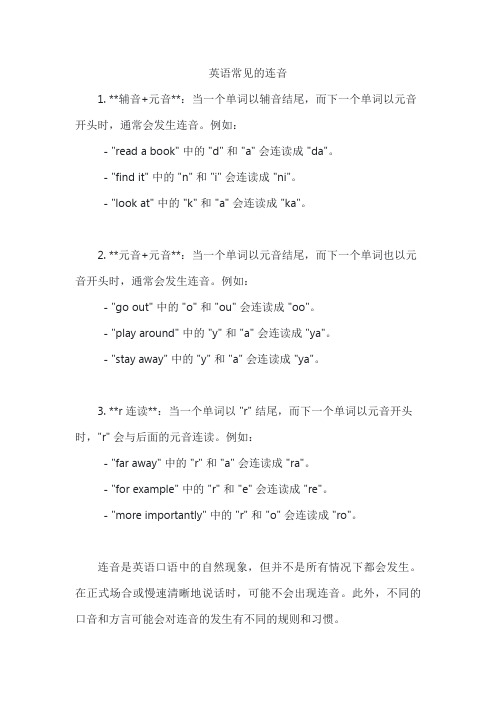
英语常见的连音1. **辅音+元音**:当一个单词以辅音结尾,而下一个单词以元音开头时,通常会发生连音。
例如:- "read a book" 中的 "d" 和 "a" 会连读成 "da"。
- "find it" 中的 "n" 和 "i" 会连读成 "ni"。
- "look at" 中的 "k" 和 "a" 会连读成 "ka"。
2. **元音+元音**:当一个单词以元音结尾,而下一个单词也以元音开头时,通常会发生连音。
例如:- "go out" 中的 "o" 和 "ou" 会连读成 "oo"。
- "play around" 中的 "y" 和 "a" 会连读成 "ya"。
- "stay away" 中的 "y" 和 "a" 会连读成 "ya"。
3. **r 连读**:当一个单词以 "r" 结尾,而下一个单词以元音开头时,"r" 会与后面的元音连读。
例如:- "far away" 中的 "r" 和 "a" 会连读成 "ra"。
- "for example" 中的 "r" 和 "e" 会连读成 "re"。
- "more importantly" 中的 "r" 和 "o" 会连读成 "ro"。
英语连读规则大全实用
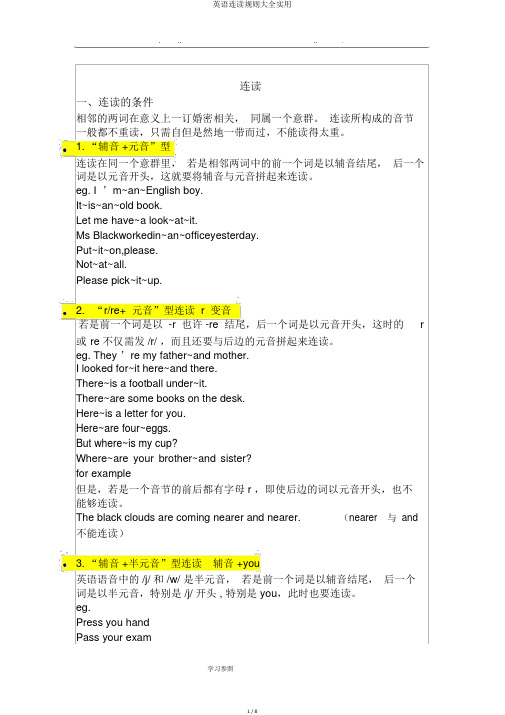
......连读一、连读的条件相邻的两词在意义上一订婚密相关,同属一个意群。
连读所构成的音节一般都不重读,只需自但是然地一带而过,不能读得太重。
1.“辅音 +元音”型连读在同一个意群里,若是相邻两词中的前一个词是以辅音结尾,后一个词是以元音开头,这就要将辅音与元音拼起来连读。
eg. I ’m~an~English boy.It~is~an~old book.Let me have~a look~at~it.Ms Blackworkedin~an~officeyesterday.Put~it~on,please.Not~at~all.Please pick~it~up.2.“r/re+ 元音”型连读 r 变音若是前一个词是以 -r 也许 -re 结尾,后一个词是以元音开头,这时的r 或re 不仅需发 /r/ ,而且还要与后边的元音拼起来连读。
eg. They ’re my father~and mother.I looked for~it here~and there.There~is a football under~it.There~are some books on the desk.Here~is a letter for you.Here~are four~eggs.But where~is my cup?Where~are your brother~and sister?for example但是,若是一个音节的前后都有字母 r ,即使后边的词以元音开头,也不能够连读。
The black clouds are coming nearer and nearer.(nearer与and 不能连读)3.“辅音 +半元音”型连读辅音 +you英语语音中的 /j/ 和 /w/ 是半元音,若是前一个词是以辅音结尾,后一个词是以半元音,特别是 /j/ 开头 , 特别是 you,此时也要连读。
eg.Press you handPass your examguess your ageDid you see itdid you like itThank~you.Nice to meet~you.Did~you get there late~again?Would~you like~a cup~of tea?Could~you help me, please?“音的同化”—常把 /d/+/j/ 读成 /dV/ ,did you 听上成了 /dIdVu/ ,would you 成了 /wudVu/ , could you 成了 /kudVu/ 。
辅音与元音的连读
I haven’t had a chance to go abroad.
01
id you find out’m worried about tomorrow’s exam.
03
Exercise 3
2./t/与元音的连读 get along Dialog: We never get along M: what happened to you and Jack? W: we broke up. I don’t want to see him anymore. It’s all over now. M: what do you mean? I thought he was your Mr. Right. W: No. We never get along.
I don’t think the cross talk is funny at all.
Just walk straight ahead and you’ll find the post office on your right.
The game is so boring. Let’s get out of here.
5.I’ll leave my video camera here. Please_____eye _____. 6. I’m_____tomorrow’s interview. 7. Just walk ____and you’ll find the bank on your right. 8. Let’s _____fingers crossed for them. 9. The movie is so boring, let’s ________here. 10.We can _____of their weakness and beat them.
(完整版)英语连读规则(整理版)
连读连读的条件:相邻的两词在意义上必须密切相关,同属一个意群。
连读所构成的音节一般都不重读,只需顺其自然地一带而过,不可读得太重,也不可音。
(连读符号:~)(1)“辅音+元音”型连读在同一个意群里,如果相邻两词中的前一个词是以辅音结尾,后一个词是以元音开头,这就要将辅音与元音拼起来连读。
I’m~an~English boy It~is~an~old book Let me have~a look~at~it.Ms Black worked in~an~office last~yesterday.I called~you half~an~hour~ago.Put~it~on, please.Not~at~all.Please pick~it~up.(2)“辅音+辅音”型连读叠合:即前面单词尾音辅音于紧随其后的单词的起始辅音为同一音时,只需读一次,而不必将这个音读两次。
这种情形常发生在[p]、[b]、[t]、[d]、[k]、[g]等辅音出现的时候。
失去爆破:顾名思义,指爆破音失去爆破。
发生的条件如下:当前面的单词以[p]、[b]、[t]、[d]、[k]、[g]这六个爆破音中的任何一个结尾,而紧随其后的单词是以辅音开头的,这时前面单词中的爆破音失去爆破,即由相关的发音器官做好这个发音的姿势,稍做停顿后即发后面的爆破音。
1.“爆破音+爆破音”型6个爆破音中的任意2个相临时,爆破前一个爆破音会失去,即由相关的发音器官做好这个发音的姿势,稍做停顿后即发后面的爆破音。
The girl in the re(d) coat was on a bla(ck) bike jus(t) now.The bi(g) bus from the fa(c) tory is full of people.Wha(t) time does he get up every morning?This is an ol(d) pi(c)ture of a bi(g) car.The ol(d) do(c)tor has a ca(t), too.We’re going to work on a farm nex(t) Tuesday.What would you like, ho(t) tea or bla(ck) coffee?It’s a very col(d) day, but it’s a goo(d) day.You can put i(t) down in the bi(g) garden.I bought a chea(p) book, but it’s a goo(d) book.2.“爆破音+摩擦音”型如果前面是爆破音,其后紧跟着某些摩擦音(如/f/,/s/,/W/,/T/等),那么前面那个爆破音仅有十分轻微的爆破,而后面那个摩擦音则要完全爆破。
英语连读规律
英语连读规律先看连读,连读分五种:第一种,辅音音标和元音音标的连读,两个同一意群内的单词,如果前面单词的最后一个音标为辅音音标,与之相邻的后面的单词的头一个音标为元音音标,一般要连起来读,如:Look at get out above all put it on all of us not at all等。
第二种连读为叠音连读,两个相邻单词相邻的两个音标相同或相近,前者不发音。
如:great teacher bad day with the what’s so 等。
第三种连读击穿连读,两个单词相邻, 前面单词的尾音标为辅音音标,后面单词的第一个音标为字母h所发的/h/ 这个时候,前面的辅音击穿/h/和后面的元音形成连读。
如with him,实际读音为/`wiδim/;tell her 实际读音为/`telЭ/,第四种连读,两个单词相邻,前面单词的最后一个音标以u结尾。
而后面单词的头一个音标为元音音标,此时,这两个音之间会有半元音/w/的连读。
比如go+[ w] +on, how+[ w] +are, do+ [w]+ it等等。
第五种连读:两个单词相邻,前一个单词的最后一个元音为i,而后面单词的头一个音为元音音标,此时这两个元音之间会有半元音[j]的连读。
比如stay +[j] +up, the+[ j] +other, may+[j]+ I等等。
第二种音变:吞音。
在快速的语流中,爆破音后接辅音音标时,爆破音[p][b][t][d][k][g]会失去爆破。
比如grea(t) day, ba(d) man, blac(k) board。
等。
第三种音变,当音标[t][ts]后接半元音[j]时,口型会由原来的咧嘴变为撅嘴型,同化为音标/t∫/,音标[d][dz]后接半元音[j]时口型也会有原来的咧嘴变为撅嘴型,同化为音标/ dз/,比如meet you发音为/`mi:t∫ju:/ can’t you的发音为/ka:t∫ju:/,and you的发音为/Эedзju:/ education的发音为/edзju:`kei∫Эn/等等。
美语语音--连读规则
1.最常见弱读单词
a am an and are as at be been but can do does for from had has have he her/him is me must not of or shall should sir some than that the them there till to us was were will you
发音规则
1. 弱读 2. 略读
3. 缩读 4. 连读 5. 同化 6. 叠合 ⒎ 失爆
3. 缩读
两个或两个以上单词读音的合并现象.
3. 缩读
两个或两个以上单词读音的合并现象.
①They have→They’ve; ③He is →He’s ②They are →They’re ④are not →aren’t
1.最常见弱读单词
a am an and are as at be been but can do does for from had has have he her/him is me must not of or shall should sir some than that the them there till to us was were will you
★ ⑴ 前面的单词以元音[e]或[i]或[ai]结尾,紧随其后的单 词以元音开头,这时,在两个单词之间出现[j]作为过渡
- 1、下载文档前请自行甄别文档内容的完整性,平台不提供额外的编辑、内容补充、找答案等附加服务。
- 2、"仅部分预览"的文档,不可在线预览部分如存在完整性等问题,可反馈申请退款(可完整预览的文档不适用该条件!)。
- 3、如文档侵犯您的权益,请联系客服反馈,我们会尽快为您处理(人工客服工作时间:9:00-18:30)。
B 口头翻译以下句子 1. 到处都有捣乱分子 2. 你明白我的意思吗? 3. 我已经无法忍受了。 4. 我一点也不觉得这个故事有趣。 5. 我听说过,但没试过。 6. 多数人都准时到了场。 7. 有的人取笑她,但她不在乎。 8. 不要和别人讲这件事.
2./t/与元音的连读
get along
Dialog: We never get along
M: what happened to you and Jack? W: we broke up. I don’t want to see him anymore.
It’s all over now. M: what do you mean? I thought he was your Mr.
3. W: I heard you caught a thief this morning. M: Yes. I saw a lady left her bag on the seat. The thief was about to grab it when I caught his hand.
Exercise 3
yesterday. W: really? It must be a big one. Let’s go and check it
out.
Exercise 1
1. take it easy 2. look at me 3. we can take advantage of their weakness and beat them.
office on your right. 3. The game is so boring. Let’s get out of here.
3./k/与元音的连读
check it out
Dialog: Let’s check it out
M: are you free this afternoon? W: yes, what? M: I heard a new aquarium was open in the zoo
Exercise 1
1. I hope you can help us with this job. 2. Most people showed up on time. 3. He walks so fast. I have to run to keep up with him.
Exercise 2
5. /b/和/g/与元音的连读
the fog of war
Dialog: the fog of war
M: I just watched a documentary film, it’s very good. W: what’s its name? M: the fog of war. It won an Oscar in 2004.
Right. W: No. We never get along.
Exercise 1
1. I don’t get it. 2. It’s not impossible. 3. You know what I mean?
Exercise 2 1. W: Can I see my gift now? M: OK. Open your eyes. It’s right in front of you.
M: There are bad apples everywhere. Why isn’t someone doing something about it?
Exercise 1
1. stand up, please. 2. I can’t stand it anymore. 3. I’m not good at math.
M: what do you think of our national soccer team? Can they make it to the world cup finals?
W: it’s going to be difficult, but not impossible. Let’s keep our fingers crossed for them.
Exercise 2 1. W: How did you know so much about NBA? M: I often log on to its website. You can find everything there.
2. M: Are you looking for a part-time job? W: Yes. I hope I can be a lab assistant next semester.
Exercise 3
1. He took a sip of coffee and stood up. 2. I’ll leave my laptop here. Please keep an eye on it. 3. He picked up a magazine and began to read.
1. W: Stop it! M: What? What did you say? W: I said “stop it”!
2. W: Who are you? M: I’m just looking here. W: Step aside.
3. W: Does anyone else know it? M: No, please keep it a secret.
3. W: You promised to give a treat if you lose. Do you want to take it back now?
M: Of course not. A promise is a promise. I won’t take it back.
Exercise 3
1./d/与元音的连读
bad apples
Dialog:bad apples M: How long have you been waiting in line? W: Almost 40 minutes. I think some people are
trying to cut in line in the front.
1. He used to work in a bar. 2. He put a stark of magazines in front of us. 3. The exam is only a week away.
4./p/与元音的连读
keep our fingers crossed
Dialog:let’s keep our fingers crossed for them
1. What does the national flag of France look like? 2. Teaching is the best job in the world for me. 3. I remember leaving my handbag on the table.
测验1 a 听录音,补全下面的句子
2. M: How long have you know Janet? W: More than 5 years. She’s not only my
classmate but also my best friend.
3. W: Tell me about the first time you stood up rvous?
Exercise 1
1. How did your job interview go? 2. The first leg of his five-nation tour is in Germany 3. What color is your suitcase? Could you describe it, please?
5.I’ll leave my video camera here. Please_____eye _____. 6. I’m_____tomorrow’s interview. 7. Just walk ____and you’ll find the bank on your right. 8. Let’s _____fingers crossed for them. 9. The movie is so boring, let’s ________here. 10.We can _____of their weakness and beat them.
1 . A promise is a promise. I won’t _______back.
2.Did you ______who______? 3.He ______music CDs ______us. 4.I seldom speak English, I’m _____making mistakes.
Exercise 2 1. M: Have you heard of the three R’s. it is a way of
learning. W:I’ve heard of it. I ’ve never tried it.
2. W: I heard Mike and Tracy were divorced. M: Mike told me about it. They never loved each other
英语中的连读技巧
连读可分为辅音与元音连读、元音与元音连 读和辅音与辅音连读三大类
一、辅音与元音的连读
1. we’re not afraid of them. /ә’freidәv/
2. he turned out to be our new boss. /tә:n’daut/
辅音与元音的连读(1)
3. W: I seldom speak English. I’m afraid of making mistakes.
